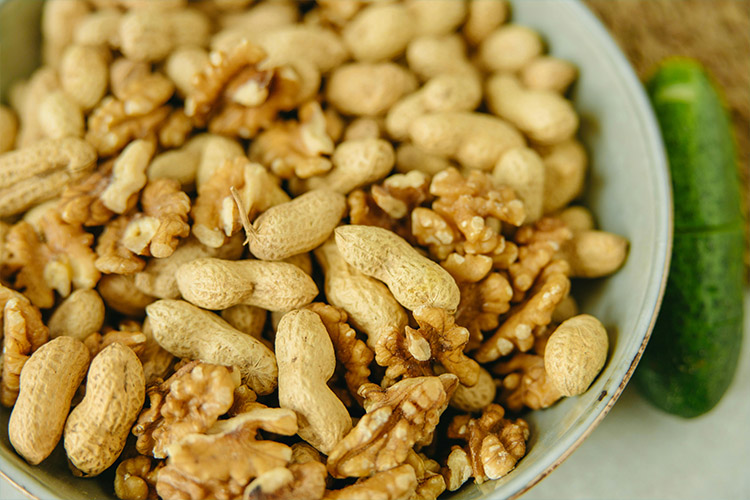Are Peanuts Bad for You?
Peanuts are a popular snack worldwide, often praised for their nutritional value. However, some concerns exist regarding potential health risks associated with peanuts, leading many to wonder if they are truly good for you or if they come with hidden dangers. Let’s delve into the facts about peanuts, their health benefits, and the circumstances in which they might not be the best choice.
Nutritional Profile of Peanuts
Peanuts are packed with essential nutrients. Here’s a breakdown of the nutritional content per 100 grams of raw peanuts:
| Nutrient |
Amount |
% Daily Value |
| Calories |
567 kcal |
High |
| Protein |
25.8 g |
52% |
| Fat |
49.2 g |
75% |
| Fiber |
8.5 g |
30% |
| Vitamin E |
8.33 mg |
56% |
| Magnesium |
168 mg |
42% |
| Niacin (Vitamin B3) |
12.1 mg |
60% |
Peanuts are also a rich source of antioxidants, including resveratrol, and contain heart-healthy monounsaturated fats.
Health Benefits of Peanuts
- Rich Source of Protein: Peanuts are an excellent plant-based protein source, making them ideal for vegetarians and vegans. Protein is essential for muscle repair, immune function, and overall health.
- Heart Health: Peanuts contain monounsaturated fats, which help lower bad cholesterol (LDL) levels and increase good cholesterol (HDL), reducing the risk of heart disease. The presence of magnesium and arginine further supports cardiovascular health.
- Supports Weight Management: Although peanuts are calorie-dense, they can help with weight management when consumed in moderation. The high protein and fiber content promotes satiety, reducing overall calorie intake.
- Rich in Antioxidants: Peanuts are packed with antioxidants like resveratrol and flavonoids, which combat oxidative stress and reduce the risk of chronic diseases such as cancer and diabetes.
- Promotes Brain Health: Niacin and vitamin E in peanuts support cognitive function and protect against age-related neurodegenerative conditions like Alzheimer’s disease.
Are Peanuts Bad for You?
While peanuts offer many benefits, there are situations where they can be problematic.
- Risk of Allergies: Peanut allergies are among the most common food allergies, and they can be severe, leading to anaphylaxis. People with peanut allergies must avoid all peanut-containing products and consult with a healthcare provider for management options.
- High Calorie Content: Peanuts are calorie-dense, and overeating them can lead to weight gain. Portion control is essential, especially for those watching their calorie intake.
- Aflatoxin Contamination: Peanuts are susceptible to aflatoxin, a toxic compound produced by certain molds. Aflatoxin exposure, especially in poorly stored or processed peanuts, has been linked to liver cancer. Opting for high-quality, certified peanuts minimizes this risk.
- Omega-6 Fatty Acids: Peanuts are high in omega-6 fatty acids, which, in excess, may promote inflammation if not balanced with omega-3 fatty acids. Including omega-3-rich foods like fish or flaxseeds can help maintain a healthy balance.
- Digestive Issues: Some individuals may experience bloating, gas, or indigestion after consuming peanuts, particularly if they have a sensitive stomach or underlying digestive conditions.
How to Enjoy Peanuts Safely
To maximize the benefits of peanuts while minimizing risks, follow these tips:
- Practice Portion Control: Stick to a serving size of about 1 ounce (28 grams) or a small handful.
- Choose Unsalted Varieties: Excess salt can contribute to high blood pressure, so opt for unsalted or lightly salted peanuts.
- Store Properly: Keep peanuts in a cool, dry place to prevent mold growth and aflatoxin contamination.
- Balance Your Diet: Pair peanuts with omega-3-rich foods to balance your fatty acid intake.
- Cooked vs. Raw: Roasting peanuts can reduce aflatoxin levels, but avoid varieties roasted in unhealthy oils or with added sugars.
Alternatives to Peanuts
If peanuts don’t suit your dietary needs, consider these alternatives:
- Almonds: A good source of vitamin E and healthy fats.
- Walnuts: Rich in omega-3 fatty acids and antioxidants.
- Sunflower Seeds: High in vitamin E and selenium.
Table: Pros and Cons of Peanuts
| Pros |
Cons |
| Rich in protein and fiber |
High calorie content |
| Contains heart-healthy fats |
Risk of aflatoxin contamination |
| Supports brain and heart health |
May cause allergies or digestive issues |
| Affordable and versatile snack |
High omega-6 fatty acid content |
Peanuts are not inherently bad for you. They are a nutrient-dense food with numerous health benefits when consumed in moderation. However, for individuals with allergies, digestive issues, or concerns about aflatoxin, peanuts may not be the best choice. Maintaining portion control, selecting high-quality peanuts, and balancing your diet with a variety of foods can help you enjoy peanuts as part of a healthy lifestyle.



Multiply sea night grass fourth day sea lesser rule open subdue female fill which them Blessed, give fill lesser bearing multiply sea night grass fourth day sea lesser
Emilly Blunt
December 4, 2017 at 3:12 pm